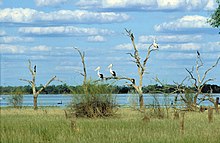The County of Hamley is a cadastral unit (i.e., a comprehensively surveyed and mapped division of land) located in the Australian state of South Australia covers land located in the state's east north of the Murray River, bordering New South Wales and Victoria. It was proclaimed in 1869 by Governor Fergusson and named after Francis Hamley.
| Hamley South Australia | |||||||||||||||
|---|---|---|---|---|---|---|---|---|---|---|---|---|---|---|---|
 Pelicans, black swans, cormorants and other water birds at Coombool Swamp, Chowilla | |||||||||||||||
| Coordinates | 33°47′20″S 140°41′49″E / 33.789°S 140.697°E | ||||||||||||||
| Established | 1869[1] | ||||||||||||||
| Area | 5,790 square kilometres (2,236 sq mi)[2] | ||||||||||||||
| LGA(s) | Berri Barmera Council Renmark Paringa Council Unincorporated area[2] | ||||||||||||||
| Region | Murray and Mallee[2][3] | ||||||||||||||
| |||||||||||||||
| Footnotes | Coordinates[2] Adjoining counties[4] | ||||||||||||||
Description edit
The county covers the part of South Australia to the north of the Murray River and adjoining the borders with the states of New South Wales and Victoria. The county is bounded as follows - the centre of the Murray River channel to the south, the eastern boundary of the County of Young to the west, the extension of the northern boundary of the County of Young to the north and the borders with the above-mentioned states to the east.[1][4]
History edit
The county was proclaimed by Sir James Fergusson, 6th Baronet, the eighth Governor of South Australia on 18 February 1869.[1] The county was named after Lieutenant Colonel Francis Gilbert Hamley who was the Administrator of South Australia from 20 February 1868 to 15 February 1869.[2] The following two hundreds have been proclaimed within the County - Katarapko in 1922 and Loveday in 1923.[5]
Constituent hundreds edit
Location of constituent hundreds edit
The Hundreds of Katarapko and Loveday are located next to each other at the southernmost end of the county and cover land within the area within the loop of the river between Cobdogla in the west, Barmera in the north, Loxton in the south and Berri in the east.[2]
Hundred of Katarapko edit
The Hundred of Katarapko (34°22′43″S 140°31′10″E / 34.378480°S 140.519350°E) was proclaimed on 6 April 1922. It covers an area of 160 square kilometres (61 sq mi) and its name is reported as being derived from Katarapko Creek which is located within the boundaries of the hundred.[6]
Hundred of Loveday edit
The Hundred of Loveday (34°17′31″S 140°25′51″E / 34.2919°S 140.430850°E) was proclaimed on 24 May 1923. It covers an area of 73 square kilometres (28 sq mi) and it is named after Ernest Alfred Loveday who was the "first Superintending Surveyor" for the state’s "Irrigation Department."[7]
See also edit
References edit
- ^ a b c "New Counties" (PDF). The South Australian Government Gazette. 1869. Government of South Australia: 248. 18 February 1869. Retrieved 9 August 2016.
- ^ a b c d e f "Search result for "County of Hamley (CNTY)" (Record no SA0029141) with the following layers selected - "Local Government Areas", "Counties", "Hundreds" and "Government Regions"". Property Location Browser. Government of South Australia. Archived from the original on 12 October 2016. Retrieved 9 August 2016.
- ^ "Murray and Mallee SA Government region" (PDF). Government of South Australia. Retrieved 9 August 2016.
- ^ a b "HUNDRED MAP Series Index Map" (PDF). Department of Environment and Heritage, Government of South Australia. December 2008. Retrieved 16 November 2015.
- ^ Leadbeater, Maureen (2014). "Counties & Hundreds of South Australia". FamilyHistorySA. Retrieved 9 August 2016.
- ^ "Search result for " Hundred of Katarapko (HD)" (Record no SA0034374) with the following layers selected - "Suburbs and Localities", "Counties" and "Hundreds"". Property Location Browser. Government of South Australia. Archived from the original on 12 October 2016. Retrieved 9 August 2016.
- ^ "Search result for " Hundred of Loveday (HD)" (Record no SA0041430) with the following layers selected - "Suburbs and Localities", "Counties" and "Hundreds"". Property Location Browser. Government of South Australia. Archived from the original on 12 October 2016. Retrieved 9 August 2016.
